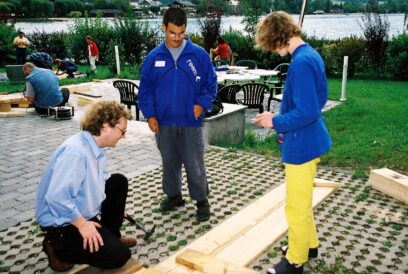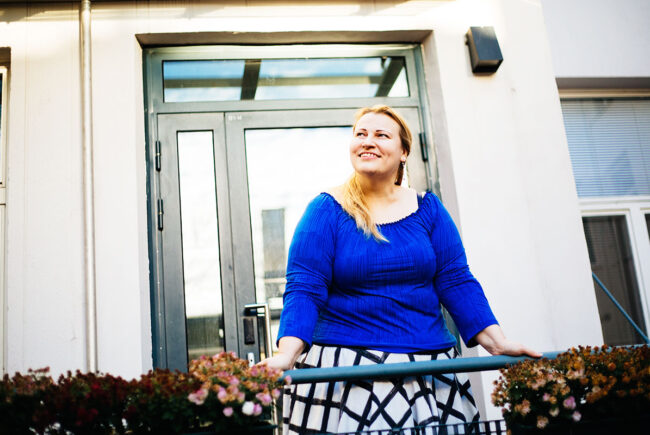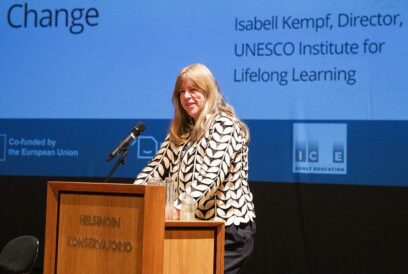

The idea of lifelong learning, which is well-established in Finland, is quite foreign to many immigrants, says Gunta Alfors. / Photo: Karoliina Knuuti
The idea of lifelong learning, which is well-established in Finland, is quite foreign to many immigrants, says Gunta Alfors. / Photo: Karoliina Knuuti
Behind difficulties in job searching for immigrants, there is often a lack of knowledge about the rules of local working life. In Finnish mentoring projects, the problems are solved together with a local colleague.
According to statistics, in Finland finding work is more difficult for immigrants than for the overall population.
Negative attitudes explain the phenomenon at least partly: a foreign name of an applicant or lack of language skills continue to close some doors.
Yet, a Finnish expert Gunta Ahlfors argues that the problem is often much easier to resolve. She works at the Family Federation of Finland, an organisation that coordinates projects promoting immigrant employment.
“The biggest challenge is that immigrants lack the experience of the labour market in their new home country and how their own expertise fits in it,” Ahlfors says.
Learning the spoken and unspoken rules would take the jobseeker a long way. However, country-specific guidebooks are not available, and could not be, as the rules keep on changing.
That is why a mentor is needed, a local who works in the same field.
Gunta Ahlfors
- is a Helsinki-based Master of Science (Economics);
- works for Väestöliitto – the Family Federation of Finland, an expert organisation that acts in social and health sectors.
- Womento (for women only) an Promento (men and women) support educated migrants and help them to create networks and deepen their knowledge of Finnish working life and habits.
- Participants are invited by open call twice a year, autumn and spring. The best matches of so-called mentors and actors are chosen to participate.
- The newest project, Way to employment, funded by European Social Fund, is targeted at less privileged immigrants, who have been unemployed for a long time, usually due to family or health issues.
- The Family Federation of Finland also organises courses in, for example, sexual health and equality for immigrants.
The problems of the highly educated are often tangible
One of the projects that tackles these issues is called Womento. It is targeted at highly educated immigrant women, who already have knowledge of the local language, prior work experience and a strong will to find work in their own field.
Still, many of them spend years struggling to find a job. In fact, the time that immigrant women spend unemployed is up to twice as long as it is for immigrant men with the same educational background.
Gunta Ahlfors says that when they succeed in finding a mentor from the same field, the reason behind the difficulties may be as simple as in, for example, one case, where it turned out that the applicant had a ten-page CV!
The style of how to express one’s interest in a job varies from country to country and field to field.
“With the mentor, the CV was summarised, which was apparently a heart-rending task. When there were only two pages left, it took only a couple of months and the jobseeker got a job in her own field,” Ahlfors explains.
She gives more tangible examples. In some sectors, it is necessary to have a LinkedIn profile, while in others it is not. Also, the style of how to express one’s interest in a job varies from country to country and field to field.
On some occasions, interpreting job descriptions may be difficult. Some titles such as “designer” or “spokesperson” may not but be fully clear to foreigners. You need to know what kind of tasks the title contains in a particular sector.
In addition, networks play a very important role in Finland.
“It’s estimated that up to 80% of recruitments are done through networks and, in case of open searches, the referee plays a very important role. Without a Finnish referee, an immigrant may not be perceived as trustworthy.”
The longer you have been out of work, the more encouragement is needed
This autumn, the Family Federation of Finland has launched another project, Way to Employment, this time targeting immigrant people who have been at home for a long time due to family or health issues.
A typical example of the project’s target group could be a woman who came to Finland 10 years ago and stayed at home to care for her children. When the youngest of the children goes to school, doing something outside home becomes an option.
According to Gunta Ahlfors, meeting these people is a delicate matter; a good amount of time is needed to build trust. It is possible, for example, that no-one has ever asked the person what she wants for herself.
It is not discriminating against immigrants, as each and every Finn also has to adapt to having to wake up in the morning, even if they do not feel like it.
“The idea of lifelong learning, which is well-established in Finland, is quite foreign to many immigrants. In my previous work, I met a woman who hesitated when I asked what sector she wanted to find employment in, because she felt she was already old. She was 37 years old and had had her children very young, so she would be expecting some grandchildren soon. Astonished, I said ‘you should understand that you still have some 30 years of work ahead of you!’”
In addition, when a housewife moves into work, her role will change drastically, and her culture will not necessarily support this change, so committing to the rules of working life can be particularly difficult.
Therefore, mentoring works also preventatively: the expectations people will have of them when they go to work or study are reviewed step-by-step.
“For example, in Finland, if you say that you will show up at a certain time, you are expected to do it. It is not discriminating against immigrants, as each and every Finn also has to adapt to having to wake up in the morning, even if they do not feel like it,” says Ahlfors.
Sometimes the opposite can happen: the newcomer sits alone by her desk working from morning until night. Finns, on the other hand, expect everyone to take part in coffee breaks, as it helps to build community spirit. An immigrant may not understand this, as maybe she doesn’t drink coffee – or maybe she does not even know that the law grants her a right to breaks.
“If you have been in Finnish working life for a long time, such things are self-evident. And that’s why it does not necessarily even come to mind to tell the newcomer that it would be good to attend these breaks, even if he or she doesn’t have a taste for coffee.”
The goal is to find one’s own path
The results of the mentoring projects are good: during the Womento process of about eight months, one-third manage to find a job in their own field. Some participants become self-employed and some enrol in Finnish education.
Officials do not have time to focus on questions about dreams and motivation. They steer people towards the sectors that need labour.
According to Ahlfors, empowerment is the key for immigrants to be able to make their own decisions with self-confidence and commit to them. Some participants are even steered away from previous choices if it is found that they were made with insufficient information.
“We promote the well-being of the women and the achievement of their goals, whatever they are. Of course, employment is the number one goal for many, but often with the mentor, they will conclude that additional training is needed,” she says.
Often, officials do not have time to focus on questions about dreams and motivation. They look at the situation from the point of view of the receiving country. They steer people towards the sectors that need labour. In Finland, such a profession has often been a practical nurse.
Everyone is good at something, whether it be childcare or even the legislation or pedagogy of another country.
“Such automatic guidance is dangerous. There may even be fears involved – ‘When the authority says so, I will go’. And then maybe they go and drop out later. At the same time, the place is denied to someone who would really want to get into that field of study.”
Ahlfors emphasises that everyone is good at something, whether it be childcare or even the legislation or pedagogy of another country. Then one should build on it and not start over.
“I get really frustrated when I hear that someone has a Master’s degree in economics and has worked for several years in a firm, but then the bureau has guided her to start studying economics at vocational school level. What a waste of my tax money!”
The benefits are undeniable
Instead, everyone will benefit if a skilled immigrant reaches an expert level job, brings their knowledge to the good of society and beginning to pay taxes. We did not even have to educate them first.
Orations do not help when Dad is driving a bus, whilst holding a PhD.
Additionally, if people are happy with their position in working life, studies show that they are healthier and more independent, and integrate better into society.
On the contrary, according to Ahlfors, if a highly educated person does not manage to land in such a position in their new home country, but ends up in a blue-collar job instead, she/he is more likely to be depressed and feel that she/he is not appreciated. Deprivation is infectious, studies show.
“Orations do not help when Dad is driving a bus, whilst holding a PhD,” Ahlfors says.
After all, it all comes down to the principle of inclusion, and it is not just about immigrants.
“If everyone in society feels included, whether they belong to a linguistic, sexual, ethnic or religious minority, then everyone is also committed to the society and prepared to work for it,” she says.
“I’m not aware of any counter-arguments.”
Author






